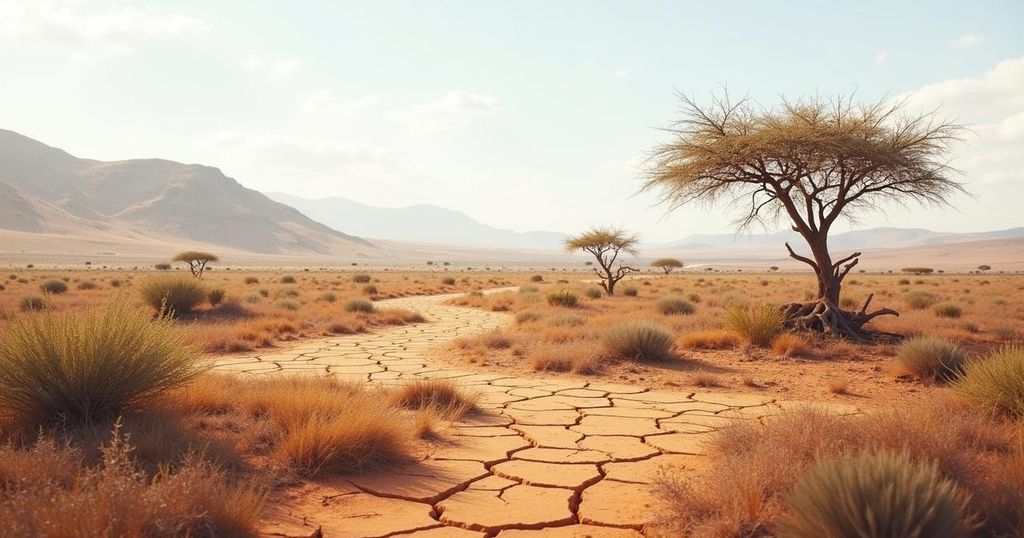Drought Crisis in Southern Africa: A Comprehensive Public Health Situation Analysis
The Southern African region faces its worst drought in 40 years due to the 2023/2024 El Niño phenomenon. This has caused severe food shortages and water scarcity, impacting nearly 23 million people. Countries like Malawi, Zambia, Zimbabwe, and Mozambique are hit hardest, with significant health and humanitarian challenges, including acute malnutrition among children. Immediate and coordinated humanitarian interventions are required to address this crisis.
The El Niño phenomenon for the period of 2023/2024 has wrought unprecedented drought conditions across Southern Africa, characterized by delayed rainfall, extended dry spells, and extreme temperatures. This climatic occurrence, noted as the most severe in four decades, has exacerbated the challenges for communities already contending with adverse microeconomic factors and failed agricultural yields. As a direct consequence, many regions are confronting substantial food shortages, compromised access to potable water, a rise in disease outbreaks, and significant loss of livestock. Data compiled from national governments and FEWS NET reveal alarming trends: maize harvests throughout the region are markedly below the average of the past five years, leading to dire food insecurity levels affecting nearly 23 million individuals. Nations most impacted include Malawi, Zambia, Zimbabwe, and Mozambique. Projections indicate that approximately 14 million people will necessitate urgent humanitarian aid during the crucial lean season spanning October to December 2024. Currently, six countries have officially declared national drought disasters: Botswana, Lesotho, Malawi, Namibia, Zambia, and Zimbabwe. Angola and Mozambique are also facing critical situations, with alarming estimates showing that about 1.8 million people in Angola and approximately 3.3 million in Mozambique are food insecure. Moreover, it is estimated that over two million children will experience acute malnutrition this year, including over 500,000 who are severely malnourished. The ramifications of these climatic shocks are profound, displacing thousands, triggering health emergencies, exacerbating food scarcity, and straining agricultural productivity. Compounding these challenges, the region is still grappling with a cholera epidemic, with water shortages further undermining hygiene practices, particularly in Malawi and Mozambique. Moreover, the emergence of mpox poses additional threats by diverting critical resources away from drought relief efforts. The concurrent drought situations exacerbate existing health vulnerabilities, increasing the risks of HIV transmission, mental health disorders, and gender-based violence. These overlapping crises heighten the already urgent necessity for robust preparedness and responsive mechanisms. The combined effects of El Niño, ongoing cholera outbreaks, regional conflicts, and the impending impacts of climate change have severely impeded access to essential health services, including sexual and reproductive health care. Over one million individuals have been displaced due to a confluence of disasters and climate-related challenges predominantly arising from Malawi, Mozambique, and Zimbabwe. This situation calls for immediate and coordinated humanitarian efforts to mitigate the effects of these compounded crises across Southern Africa.
Southern Africa has been heavily impacted by the climatic shifts associated with El Niño, particularly in the 2023/2024 event. This event has catalyzed severe droughts that have devastated agriculture, leading to significant food insecurity and health crises in the region. Many countries were already facing economic difficulties, which have been exacerbated by the extreme weather conditions. Access to clean water has become scarcer, leading to an increase in waterborne diseases, while public health efforts are strained due to overlapping epidemics and the continuous threat posed by climate change. The overall socio-economic fabric of affected nations is under severe stress, complicating recovery efforts in the months to come, particularly as communities await their next planting season.
In conclusion, the ongoing El Niño-induced drought in Southern Africa presents a complex humanitarian challenge, with nearly 23 million individuals facing food insecurity and critical public health concerns. The need for a coordinated response is urgent, as the climate-induced crises intertwine with pre-existing health vulnerabilities, including widespread cholera and malnutrition among children. Together, these factors emphasize the critical importance of immediate humanitarian assistance and sustained efforts to strengthen health systems in the face of future adverse climatic events.
Original Source: reliefweb.int




Post Comment